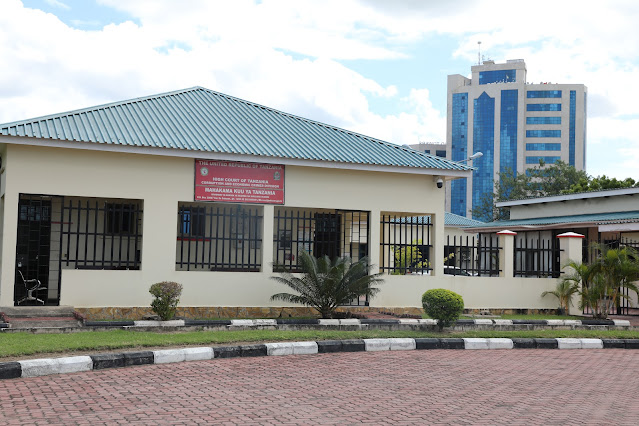By FAUSTINE KAPAMA-Judiciary
THE attempt by former Tanzania Revenue Authority (TRA)
Commissioner General Harry Kitilya and two others to challenge conviction, sentence
and orders given against them after plea bargaining arrangement for causing
loss in 600 million US dollars loan acquisition deal has failed.
This follows the decision of the High Court’s
Corruption and Economic Crime Division to dismiss the application under which
Kitilya, former Head of Investment Banking at Stanbic Bank Shose Sinare and ex-
Chief Legal Counsel to the bank Sioi Solomon, the applicants, had lodged for
such purpose.
In their move, the trio had applied for extension of
time to file another application to set aside the conviction, sentence and
orders, including paying 1.5bn/- compensation to the government made on August
25, 2020 in the economic trial they were facing, alleging misrepresentation and
involuntariness.
“It is the finding of this court, in particular
circumstances of this case, the applicants have failed to assign sufficient
cause to warrant this court to grant extension of time. Consequently, this
application is hereby dismissed,” Judge Immaculata Banzi ruled.
The counsel for the applicants had argued that the
alleged delay in lodging the application was caused by inaction of the court to
supply the applicants with copy of the proceedings of the case in order to
determine misrepresentation as a ground for setting aside the conviction
arising out of plea agreement.
However, the judge pointed out that the court was not
and was not supposed to involve in negotiations leading to the plea agreement
as per section 194A (3) of the Criminal Procedure Act, thus the fact that how,
where and when such negotiations and agreement were conducted are not part of
proceedings.
“I would agree with the submission of (the
prosecution) that the only proceedings which would assist the applicants to
determine grounds of involuntariness or misrepresentation are the proceedings
of the final day which contains facts upon which their conviction was bases,”
the judge said.
She also pointed out that whether the negotiations and
signing of the plea agreement were conducted around the court premises, when
the court was not in session, that could not mean the court was involved in
that process.
According to the judge, what transpired between the
parties which may constitute involuntariness or misrepresentation are facts
known to the parties themselves.
In that regard, she said, it was the position of the
court that the applicants did not need the proceedings of the entire case with
testimonies of witnesses in order to establish misrepresentation as submitted
by the counsel for the applicants.
“Thus, under the particular circumstances of this
case, delay in supplying the applicants with copy of proceedings does not
constitute sufficient cause to warrant this court to grant extension of time,”
Judge Banzi said.
Before penning off, she commented on the argument by
the counsel for the applicants on the novelty of plea-bargaining process in the
Tanzania’s judicial jurisdiction and that at the time his clients wanted to set
aside the said orders, the Rules to govern the process were not in place.
The judge pointed out that she was aware that the
underlying Rules, that is, the Criminal Procedure (Plea Bargaining Agreement)
Rules, 2021 were made in 2021 vide a GN No. 180 of February 5, 2021.
She was, however, quick to point out that, that could
not mean before then it was impossible to make such an application as there was
no vacuum in the law. Judge Banzi said that such applications to set aside
purported vitiated convictions were already guided under section 194G of the
CPA.
“Being an application under the CPA, as to how it
should be made, is provided under section 392A of the same Act that it can
either be orally or in written form. Much as I agree with (him) on the novelty
of the plea-bargaining concept in our jurisdiction, his argument is misplaced,”
the judge said.
The applicants and two others, Commissioner for Policy
Analysis-Debt with the Ministry of Finance Bedason Shallanda and his Assistant
Alfred Misana, were initially arraigned before the court jointly and severally
charged with 58 counts.
Such counts included leading organized crime, forgery,
uttering false documents, use of documents intended to mislead principal,
obtaining money by false pretenses, money laundering and occasioning loss to a
specified authority.
During hearing, the Director of Public Prosecutions
(DPP) and the applicants expressed a desire to enter int a plea-bargaining
agreement. The said plea agreement was negotiated by the parties, signed as
such and files for registration into court on August 25, 2020.
Following such move, the parties appeared before the
court on that day and after being examined under oaths over their voluntariness
and competence to enter into such agreement, and upon being satisfies as such,
the court accepted and registered their plea agreement.
After registration, the prosecution substituted the
information (charge sheet) by dropping 57 counts and remained with just one of
occasioning loss to a specified authority to which the applicants and the other
two-co accused pleaded guilty.
Following such plea of guilty, the facts constituting
the offence were read over to them and they all admitted to the same.
Consequently, they were all convicted on their own plea of guilty and each one
was sentenced to pay 1m/- fine or imprisoned for six months in default.
In addition, they were together ordered to pay the
1.5bn/- to the government of the United Republic of Tanzania as compensation
for the loss so occasioned. After complying with orders, the applicants decided
to return to court and filed the application in question.



Hakuna maoni:
Chapisha Maoni